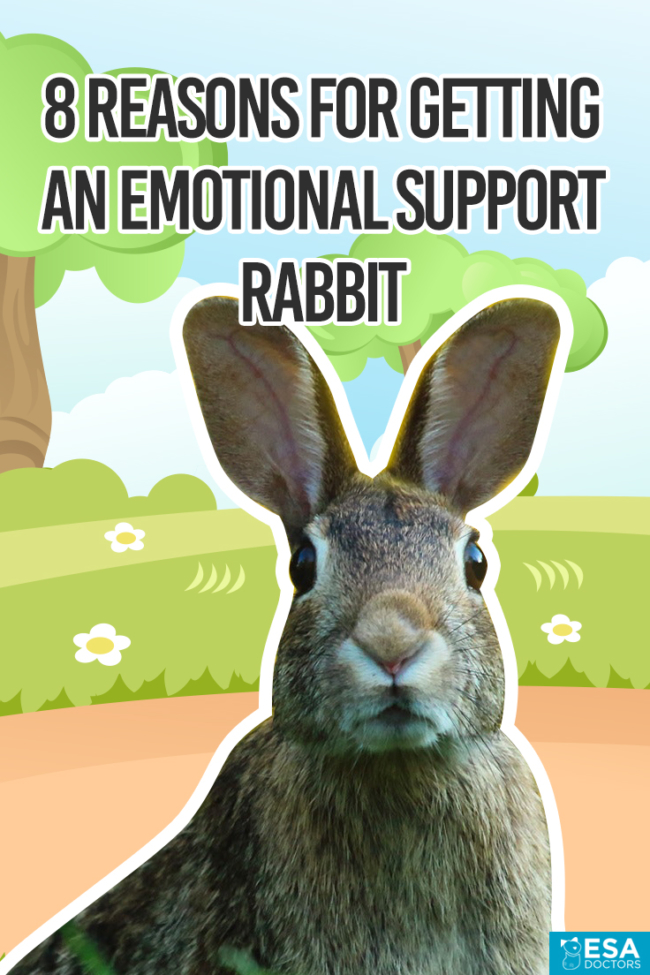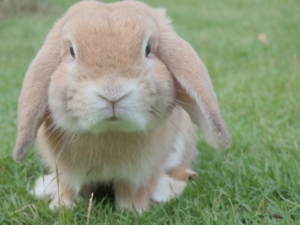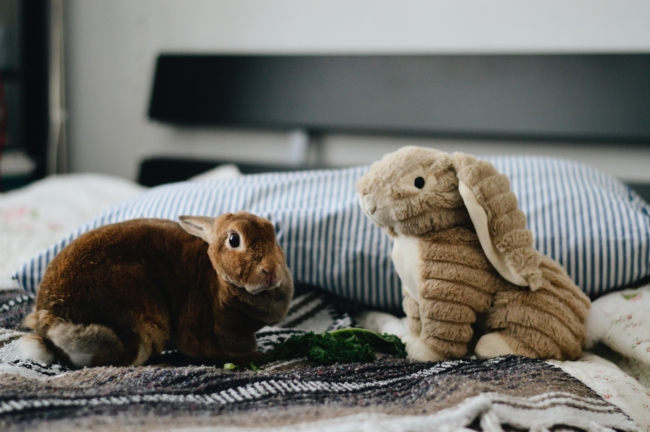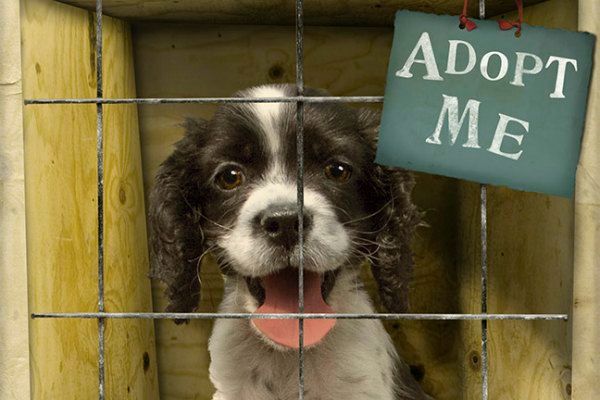While dogs and cats are the most common type of emotional support animals, they certainly aren’t the only option. Just about any type of domesticated animal can provide emotional support to its owner, and as such, will work well as an ESA. Even your favorite floppy-eared friend would make an excellent emotional support pet. Rabbits make perfect ESAs for several reasons. Here are just a few of them.

Qualify for an emotional support rabbit letter below.
1. Rabbits Are Loving and Gentle Creatures
Ask anyone who has ever owned a rabbit, and they will tell you that these adorably fuzzy creatures are gentle, affectionate, and docile by nature. Rabbits bond quickly with their owners, and their loving, caring nature makes them an ideal emotional support animal. Rabbits that have bonded strongly with their owners can recognize them by their voice and will eventually learn to come when their name is called.
Rabbits love to cuddle and be handled. They prefer gentle handling, though, so handle your bunny with care to avoid bites and scratches. They are very social and having another rabbit is great to keep them from getting depressed or stressed.
2. Bunnies Are Quiet
Does the thought of a barking dog make you shy away from the idea of having an emotional support pet? If so, a rabbit may be a good alternative. Bunnies are extremely quiet, and they are well-suited to apartment living. You’ll never have to worry about a noisy rabbit keeping your neighbors up at night, and the few squeaks they do make are seriously adorable.
3. They Don’t Require a Lot of Space
 Another good thing about having a rabbit as an ESA if you live in an apartment or a small house is that they don’t take up a lot of room. A large-breed dog may require a large backyard to roam, but a rabbit just needs a relatively small space. Caging a rabbit is not recommended, but you can use an unlocked/open cage as a litter box and/or a feeding station.
Another good thing about having a rabbit as an ESA if you live in an apartment or a small house is that they don’t take up a lot of room. A large-breed dog may require a large backyard to roam, but a rabbit just needs a relatively small space. Caging a rabbit is not recommended, but you can use an unlocked/open cage as a litter box and/or a feeding station.
If you live in a small space, make sure to rabbit-proof your home (hide and make unaccessible any exposed wires or cables) or even make a single room a bunny-friendly zone. Unlike other small emotional support animals – like rats or mice – you won’t have to worry about your rabbit going missing if it’s allowed to roam around your home.
4. Rabbits Don’t Need to Go for Walks
Also ideal for apartment dwellers is the fact that rabbits don’t need to be taken for walks. They are perfectly happy to remain safely inside their owners’ homes, and they can get plenty of exercise hopping around the house. Make sure your rabbit has at least a few hours every day to play, explore, and stretch his legs, and he will be perfectly happy.
5. Training Is a Breeze
Rabbits are surprisingly easy to train. Like cats, they instinctively know to use a litter box if one is placed in their living area. They may need a little guidance, for typically, house training comes naturally to these clean animals.
Bunnies respond well to positive reinforcement training and quickly learn to come when called and perform tricks. Provide carrots or chunks of banana or apple, and you’ll be able to train your rabbit in no time.
6. Rabbits Have Long Lives
Unlike pet rats that live 1-3 years, you can expect a pet rabbit to live 10+ years. This allows you to establish a long term bond with these cuddly creatures. Prepare for a long-term commitment if you are looking to adopt a rabbit as an emotional support animal.
7. You Can Adopt a Rabbit at Your Local Shelter
Animal shelters oftentimes have rabbits available for adoption. Adopting and raising a rabbit from a shelter can be challenging, but rewarding. Save a shelter animal’s life and make yours more robust.
8. Rabbits Are Full of Personality
 One of the great things about animals is their ability to make us smile and cheer us up when we are feeling down. They can also help relieve our stress and provide the love and companionship we crave. Rabbits have fun, unique personalities that make them perfect emotional support animals.
One of the great things about animals is their ability to make us smile and cheer us up when we are feeling down. They can also help relieve our stress and provide the love and companionship we crave. Rabbits have fun, unique personalities that make them perfect emotional support animals.
They are also undeniably adorable. Is there anything cuter than a fluffy bunny with floppy ears and a twitching nose? For people who struggle with mental or emotional disorders or abilities, all that cuteness can go a long way toward making them feel better.
Rabbits may not be the first species you think of when you are considering an emotional support animal for your mental health, but they are perfectly suited to their job. These easy-to-care-for, low-maintenance pets are ideal for apartment dwellers and anyone else who is looking for a cuddly companion that doesn’t require a lot of space. Just give your bunny lots of love and treats, and you’ll have a very happy companion.








There’s quite few incorrect things in here…
They in general do NOT like being handled at all.
They are definitely not low maintenance animals.
Bonding can take quite a lot of time.
They do need space to roam. If you keep one caged it can become aggressive and territorial.
They are trainable, but I would not call it a breeze. My first rabbit took to a litter box immediately, however the one I have now a year+ later still won’t use one.
All that said, if you’re up for it I highly recommend one.
Thanks for sharing your perspective. There are certainly many types of rabbits with different personalities, tendencies and needs that owners should be mindful of.
I wouldn’t really consider a rabbit to be low maintenance. It’s not really their fault, but hay is the main part of their diet and it’s very difficult to keep hay contained XD. They also poop a LOT and it’s not easily scoopable like cat poop.
That being said, my rabbit was better for me than online counseling and medication combined. I don’t know exactly why — it actually took quite a while to form a bond. He was very shy and any time I would try to pet him, he was very wary and suspicious of me. Over time though, I built up trust with him and now he is my little best buddy. He’s such a sweetie and it makes me so happy just to sit there and pet him and scratch his cheeks and behind his ears.
So a rabbit is well worth the reward, but know what you’re getting into. He won’t love you anywhere near as quickly as a dog, and he may never like being picked up. He might be a bit messy and it might take some time to teach him what he can and cannot chew on. But I personally found bonding with a rabbit to be more rewarding than a dog or cat.
What breed rabbit do you have? I know each breed have very different personalities and I’m in search of a lower maintenance rabbit for my daughter and want to know which breeds easiest
Hi Kristen,
I am sorry I just came a cross your post it might be late but insightful?
I have been involved with “comfort” rabbits for a while now and have had several different breeds, the one that I am absolutely infatuated with is a cross of Mini Rex and Netherlands Dwarf. They have exceptional temperaments, are a bit more compact in size, super smart, bond really well, the fur and ear set is truly beautiful with super sweet faces. The one thing for sure Rabbits are extremely
Sensitive because of being in the “prey” category it’s important to always acknowledge this and learn from that unique quality.
I’ve got 2 rabbits and they’re a little messy but nothing I can’t handle. they’re sweet. im in an apartment and they love their little space.
I am working on A assignment for school about how animals are great companions and this reply section helped me understand the bad that comes with having a bunny too.
Other people have covered why rabbits are not THAT easy. They make wonderful pets if you have enough patience. But they are certainly NOT low maintenance.
Our rabbit is very low maintenance. Maybe it depends on the rabbit.
Hi
Some information in your page about the benefits of having a rabbit are misleading. Rabbits take time to bond with their human is not fast. Rabbits don’t like to be held because they are prey animals and they like to feel control over their bodies . They CANNOT be in a cage, otherwise the rabbit won’t be happy and is likely to be aggressive with their owners. If you can’t have your rabbit to roam free then have your rabbit in a big dog play pen instead. Rabbits are amazing pets I rescued one 3 years ago and I love him . It took me time to bond with him . Each rabbit has different personalities there are some more trusting than others .
Actually, real rabbit owner here and rabbits need lots of space. Small spaces aren’t good for them. And they do need at least a clean, grassy place to roam. They’re loud as well. Not as much as dogs or cats, but can make a lot of noise. I’m not hating, just correcting, but please double check about rabbit care if you are planning to get a rabbit
I would LOVE to see ESA animals to go in public spaces as stated above. I suffer from PTSD and Panic Attacks. My rabbit keeps me centered and comfortable.
Research on the benefits of AAT or ESA have shown to have a strong decrease in the number of patients suffering from mental health disorders, and has gained recognition among many health care providers over recent years (Fine, 2010). However, when a patient is denied entrance to a public setting due to their ESA, it spikes the rate at which their mental illness progresses. Stating such, denying these patients the right to bring their ESA in public places such as restaurants or retail stores causes a problem for those who depend on the mental assistance of their support animal. This pertinent concept and established influx of data raises an important question: “What would it take to approve emotional support animals as a service animal under the ADA?” The presence of ESA doctors allows patients who depend on their ESA to be granted public access and able to have their companion in their home, without a monthly charge.